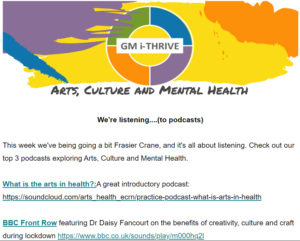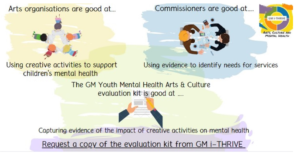The Greater Manchester Arts, Culture and Mental Health Programme is part of GM i-THRIVE, and the only THRIVE team nationally with an arts and cultural programme. Katherine Taylor, practising clinical psychologist and manager of the innovative programme discusses the aims and progress so far.
Greater Manchester i-THRIVE Arts, Culture and Mental Health Programme
Arts, Culture and Mental Health
Cultural and creative activities have been associated with human interconnectivity for thousands of years. Story-telling around a fire, prehistoric cave-paintings, group dancing and singing are all examples of the many kinds of activities humans have used for centuries to express themselves, regulate emotion, and bond.
‘Arts and culture’ covers a vast range of options; from participating in music, dance, drama, drawing, and can mean active participation, or engaging as an observer, such as at a gallery or concert.
A rapidly expanding evidence base shows the health and wellbeing benefits of participating in or engaging with arts and cultural activities. Such activities have been shown to help reduce the negative impacts of stress, keep us well, support healthy behaviours, and promote psychological processes such as reflection and expression. In addition, cultural engagement is beneficial in attachment and bonding, behavioural activation, and can be useful in addressing traumas. Engaging in cultural and arts-led activities has been found to simultaneously alleviate negative symptoms, while offering positive experiences toward recovery, this ensuring improvements are more sustainable.
Children and Young People (CYP) and the Arts:
There is strong evidence that music and reading supports speech and language development in infants, and arts engagement is linked to school readiness, a key indicator of long-term outcome. A range of promising findings suggests that the effects of arts and cultural engagement are beneficial for wellbeing, skills acquisition, and connecting people to each other and communities. Young people experiencing, or at risk of experiencing, mental health difficulties reported an increase in confidence and self-esteem after attending arts and cultural activities at Hampshire CAMHS. Other researchers have similarly identified benefits in cognitive development, school readiness, confidence and self-esteem, and peer relationships.
Why develop an Arts, Culture and Mental Health Programme?
Greater Manchester (GM) are committed to implementing the THRIVE Framework for system change (Wolpert et al., 2019) across the whole system which includes NHS, Local Authority, Voluntary, Community, Social Enterprise (VCSE), and Education Settings. Part of implementing THRIVE is broadening the mental health offer. In GM, the importance of arts and cultural activities in improving mental health and well-being of all is recognised in the Population Health Plan. In 2018 the GM i-THRIVE team commissioned an arts and culture programme lead to support the embedding of arts and cultural options to improve mental health outcomes for children and young people.
The programme is involved in activities that aim to broaden the offer and demonstrate the value and practicalities of arts provision for mental health. Programme activities fall into four broad areas; implementing arts-led options, fostering cross-sector collaboration; evaluating, and training.
Implementation:
In 2020, in partnership with Great Place, GM i-THRIVE funded four proof of concept projects that saw arts providers team up with NHS services to deliver arts-led mental health support. Proof of concept projects included wellbeing theatre, a drama group, and an art group for young people with communication difficulties focussing on transition to secondary school. This work seeks to kick-start the changes needed for more flexible, relevant and enjoyable mental health support for young people, and ensure a more rounded psycho-social service with increased choice and shared decision-making.
Early feedback from proof of concept projects has shown how the projects have been positively received by both children and young people accessing support, and the mental health professionals involved. Each of the projects was evaluated using the GM Youth Arts, Culture and Mental Health Evaluation Kit. Evaluation evidence can be used to further understand what works and for whom, as well as provide valuable insight into the practicalities of cross-sector working, where multiple perspectives and expertise are collaboratively applied.
Image 1: Feedback from young people on the impact of project

Collaboration and linking:
The GM i-THRIVE Community of Practice (CoP) is a network of 400+ individuals across dozens of sectors that work with children and young people in some capacity. Included in their regular communication from the GM i-THRIVE programme team, this network receives tools, resources, recommendations and ideas related to arts and culture for mental health. This network have been provided with short video answering frequently asked questions about arts, culture and mental health as well as providing an overview of the GM Arts Culture and Mental Health programme. Feedback suggested that the video helped individuals understand how arts tools are accessible and valuable to everyone working with children and young people.
The team lead an Arts, Culture and Mental Health Working Party to provide system leadership and responsibility to drive the implementation of the programme across Greater Manchester.
By sharing arts and wellbeing tools with the whole sector, rather than the arts-world specifically, the team aim to demonstrate that arts tools are accessible and valuable to everyone working with children and young people.
The team welcomes Arts, Culture and Mental Health Ambassadors from across the system to help champion the value of arts and culture, and to support the culture shift to a more strengths-based way of thinking when supporting young people. Over 160 colleagues in Greater Manchester from health professionals to arts practitioners have signed up. Ambassadors receive monthly newsletters with tools, up to date evidence, policy news, articles or podcasts, and access to training.
Image2: Extract from Ambassador Newsletter

Training:
Mental Health Training for Artists, with 42nd Street:
The GM i-THRIVE programme team deliver training in partnership with 42nd Street, who have for over 40 years have provided creative mental health support for young people in Manchester. This half-day workshop prepares artists for working in a mental health context.
Introduction to Arts, Culture and Mental Health e-learning:
The team have distributed an e-learning module for colleagues across all children and young people’s sectors. It seeks to set out the what, how and why of using arts and culture as supportive mental health options. The aim of the training is to introduce the idea of arts and culture as a viable treatment option. By making it free and accessible for all sectors, the intention is that this knowledge is then spread wider and eventually becomes a shared cultural idea across GM.
Arts, Culture and Mental Health training workshop:
The GM i-THRIVE programme has delivered a half-day training module for 70 senior colleagues and commissioners that seeks to highlight the benefits of arts and culture as a viable treatment options. This workshop targets the decision-makers and leaders in organisations, who can in turn influence implementing arts-based treatment into services.
Evaluation:
Without a consensus approach across arts and cultural providers, the health sector is limited in their ability to commission creative programmes. In order to support evidencing the impact of arts and culture on mental health, the Greater Manchester Arts and Culture programme team collaborated with a number of GM arts and cultural organisations in a unique, 12-month partnership to develop the Greater Manchester Youth Mental Health Arts & Culture Evaluation Kit. The purpose of this evaluation kit is to ensure that there is agreed minimum data and evidence collated when rolling out any arts and culture programme which may impact on mental health and wellbeing, and emphasise the value of qualitative and creative outcomes. The intention is that the data collated is consistent and useful in demonstrating impact to the health sector and commissioners.
The kit is free and accessible to all arts and culture organisations working with children and young people in Greater Manchester. There has been large interest in its use from the arts sector. The GM i-THRIVE team will continue working with partners in arts and culture sector and commissioners across GM to encourage use of the Kit. You can find out more about the Greater Manchester Youth Mental Health Arts and Culture Evaluation Kit here.
Image3: purpose of the Greater Manchester Youth Mental Health Arts and Culture Evaluation Kit.

The kit is free and accessible to all arts and culture organisations working with children and young people in Greater Manchester. There has been large interest in its use from the arts sector. The GM i-THRIVE team will continue working with partners in arts and culture sector and commissioners across GM to encourage use of the Kit. You can find out more about the Greater Manchester Youth Mental Health Arts and Culture Evaluation Kit here.
What has been the impact of having an arts and culture programme within Greater Manchester?
o The GM i-THRIVE programme team has conducted scoping and mapping activities of arts and cultural offers within localities.
o The development of the GM Youth Mental Health Arts & Culture Evaluation Kit allowed for the building of cross-sector relationships between health and arts practitioners.
o During the 2020 COVID-19 pandemic lockdown, the team supported the development of 22,000 Creative Care Kits to CYP who do not have easy access to the internet with mental health content to accompany the creative activities, reducing barriers to access to the arts, culture and mental health support.
o The GM Youth Mental Health Arts & Culture Evaluation Kit has been requested by 80+ organisations. Commissioners, arts organisation Directors, and the Greater Manchester Centre for Voluntary Organisation (GMCVO) stated how helpful the Kit is when thinking about evaluating an arts and cultural interventions.
o Greater Manchester has 160+ Arts, Culture and Mental Health Ambassadors. Ambassadors receive monthly resources to support them to embed cultural and creative activities when supporting children, young people and families across the 10 GM localities.
o The GM Arts and Culture programme has been featured within national conversations and policy development on the importance of arts and culture for youth wellbeing through a House of Lord roundtable, national publications including the Royal Society of Public Health and Arts Professional, and a podcast with the Mental Health Foundation.
Key learnings from the GM Arts and Culture programme:
o Curious and transparent communication around hopes, fears, and expectations of stakeholders is critical when designing and delivering projects with the aim of supporting mental health.
o Arts providers’ expertise in leading sessions for young people should be central in the planning and delivery of arts-based interventions.
o Attention should be given to enabling staff and practitioners to reflect on ways they can authentically partner to enable successful recruitment and delivery, and establish good working relationships.
o It takes time for innovative projects to become sustainable, and to develop a partnership and routines between arts providers and mental health providers.
o There is a vast assortment of activity around arts and health in the UK and internationally. Being aware of the evidence – and its limitations – can help guide decision-making in localities.
What is the future of the programme?
Since April 2019, the GM i-THRIVE programme team has worked closely with organisations and individuals from the arts and cultural sector to develop a clear vision for innovative and evidence-based partnerships. We have taken significant steps towards understanding current provision, developing relationships, sharing good practice, implementing projects and developing an evaluation framework. Our aim is to continue this work with committed system-wide leadership, and begin working with children and young people in the development of arts and mental health programmes.
Final Reflections
Have a go yourself! True person-centred care, and effective mental health services, starts with the workforce. If you don’t already have a creative hobby, experiment with what interests you. The category is wide – there’s something for everyone! And the secret to art or music-making is not talent – it’s practice.
If you would like further information, please contact Katherine Taylor at Katherine.Taylor3@mft.nhs.uk.